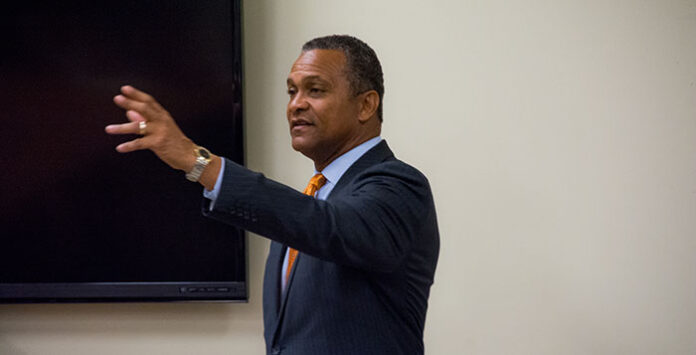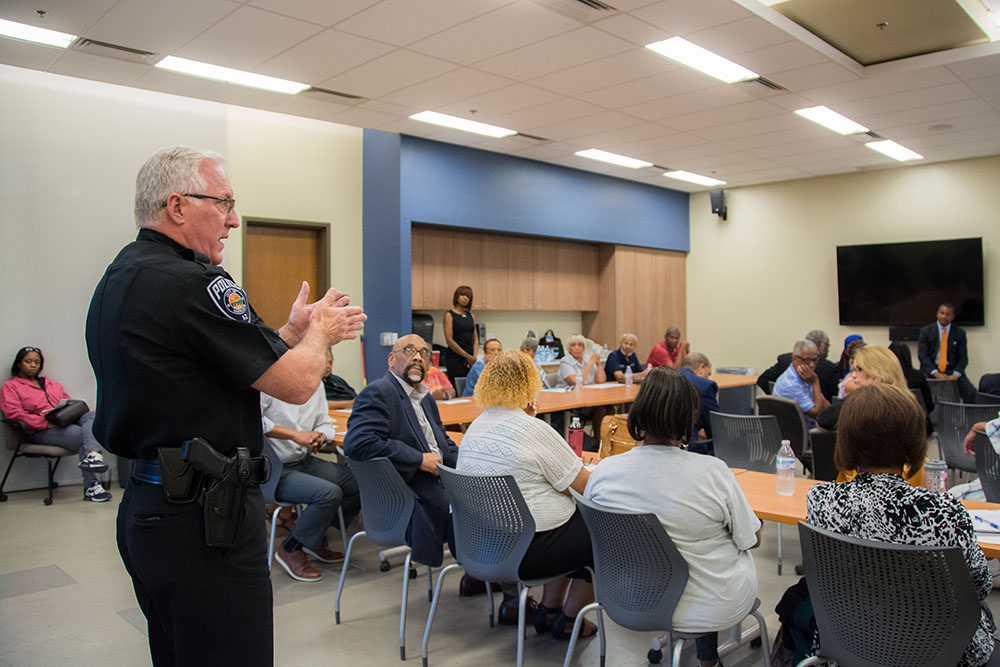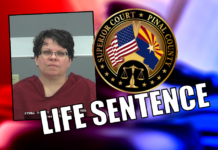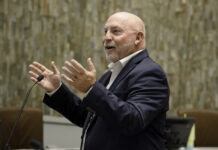
Local and state leaders met at Copper Sky Thursday to discuss African-American affairs in Maricopa, the state and across the country.[quote_box_right]“As a black person, I’ve never felt safer than here [in Maricopa].”[/quote_box_right]
The crowd of mostly African-American Arizonans came from as far away as Florence and north Phoenix to attend the town-hall style meeting hosted by former state representative Cloves Campbell Jr. and the Arizona Commission on African-American Affairs.
Topics of discussion ranged from concerns about youth poverty and education to police brutality.
Maricopa Police Chief Steve Stahl asked Campbell how the state defines youth homelessness. Stahl said when he arrived in Maricopa several years ago, he said, it was such a problem kids were sleeping on the roof of the high school.
Campbell was unable to provide the legal definition of the term, though he acknowledged homelessness is “not solely an African-American problem, it’s a work problem.”
The former legislator emphasized a need for proper education and workforce development, two things he believes will help bring about change.
Chief Stahl further indicated many young homeless people in Maricopa are “couch surfing” as a result of parents who leave the area to follow work. His hope is the state will broaden its interpretation of youth homelessness and eventually provide the city with funding and resources to help curb the issue.
On the education topic, Maricopa Unified School District Student Development Advocate Jim Irving raised concerns about the new U.S. Secretary of Education Betsy Devos and his fears that she may begin to “chip away” at the Elementary-Secondary Education Act.
Irving’s fear is exacerbated, he said, by the fact that for the past two years the state has threatened to reel in desegregation funding which MUSD and other similar districts receive. He added the state has always withdrawn the legislation before a vote could be held, thus making it unlikely those funds will be withdrawn anytime soon.
Campbell said he can help put concerned citizens in contact with relevant parties at the Department of Education, though it will likely not be Devos.
The education discussion continued around public schools versus charter schools and the apparent lack of transparency and accountability charter schools have despite receiving tax-payer funding.
Maricopa Vice-Mayor Marvin Brown said a lack of accountability and the right charter schools reserve to refuse students at their discretion could potential create a strain on public schools.
“Charter schools can cherry-pick students,” Brown said. “Public schools can’t turn them away, and that’s a problem.”
In response to the vice-mayor, Irving said “that’s OK,” and welcomed the challenge. To him, the charter schools have helped raise the bar for MUSD and other public schools, allowing those institutions to improve at great benefit to the students.

The last, and possibly most divisive, topic of discussion was that of the relationship between police and the African-American community. To that, Chief Stahl said the shooting of unarmed suspects is often the result of tactical errors made by the officer.
“Officers put themselves in that spot,” Stahl said. “We’re human, we aren’t perfect”
Officers, Stahl added, are rarely criminally liable when shooting an unarmed person, as most officers are justified if they feel the person is a threat to someone else. Civil charges, however, are quite different, meaning that even if an officer is found to not have violated the law, they can be found to have violated civil rights and the department and officer themselves can be financially liable.
One solution offered in response was to ensure that police, and all city officials, are residents of the city so they not only live among those they work for, but also must suffer the consequences of their actions. “That’s ownership” one attendee said.
Another remedy was to put an emphasis on community policing.
While ideal and preferred, Stahl said it can be difficult in fiscally conservative communities like Maricopa, with limited resources.
“Cities now realize you can get by with less,” Stahl said. “I can’t do quite as well, or as good as the good ole days when you knew your ‘beat cop,’ because I don’t have enough police officers to walk the street.”
By comparison, New York City has 4.3 officers per 1,000 residents, Maricopa has less than 1.3 officers per 1,000 residents.
Many of the attendees praised Stahl and his officers. One went so far as to say, “as a black person, I’ve never felt safer than here [in Maricopa].”
For those who expressed concern over the safety of their teenage and young adult children who may encounter police officers, Stahl said, “I encourage them to come do a ride along.”
This, Stahl said, is important to helping the African-American community and the law enforcement community rebuild trust.

![3 things to know about the new city budget Vice Mayor Amber Liermann and Councilmember Eric Goettl review parts of the city's 2024 operational budget with Mayor Nancy Smith on April 24, 2024. [Monica D. Spencer]](https://www.inmaricopa.com/wp-content/uploads/2024/04/spencer-042424-preliminary-budget-meeting-web-218x150.jpg)






![MHS G.O.A.T. a ‘rookie sleeper’ in NFL draft Arizona Wildcats wide receiver Jacob Cowing speaks to the press after a practice Aug. 11, 2023. [Bryan Mordt]](https://www.inmaricopa.com/wp-content/uploads/2024/04/cowing-overlay-3-218x150.png)



![Alleged car thief released without charges Phoenix police stop a stolen vehicle on April 20, 2024. [Facebook]](https://www.inmaricopa.com/wp-content/uploads/2024/04/IMG_5040-218x150.jpg)

![3 things to know about the new city budget Vice Mayor Amber Liermann and Councilmember Eric Goettl review parts of the city's 2024 operational budget with Mayor Nancy Smith on April 24, 2024. [Monica D. Spencer]](https://www.inmaricopa.com/wp-content/uploads/2024/04/spencer-042424-preliminary-budget-meeting-web-100x70.jpg)


